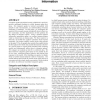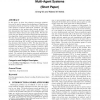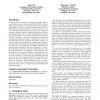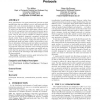106
click to vote
ATAL
2008
Springer
15 years 2 months ago
2008
Springer
Computer agents participate in many collaborative and competitive multiagent domains in which humans make decisions. For computer agents to interact successfully with people in su...
118
click to vote
ATAL
2008
Springer
15 years 2 months ago
2008
Springer
Many multiagent problems comprise subtasks which can be considered as reinforcement learning (RL) problems. In addition to classical temporal difference methods, evolutionary algo...
93
Voted
ATAL
2008
Springer
15 years 2 months ago
2008
Springer
In this paper, we develop a novel algorithm that allows service consumer agents to automatically select and provision service provider agents for their workflows in highly dynamic...
100
click to vote
ATAL
2008
Springer
15 years 2 months ago
2008
Springer
In reinforcement learning, least-squares temporal difference methods (e.g., LSTD and LSPI) are effective, data-efficient techniques for policy evaluation and control with linear v...
132
Voted
ATAL
2008
Springer
15 years 2 months ago
2008
Springer
Software maintenance and evolution is arguably a lengthy and expensive phase in the life cycle of a software system. A critical issue at this phase is change propagation: given a ...
ATAL
2008
Springer
15 years 2 months ago
2008
Springer
In this paper, we show how adaptive prototype optimization can be used to improve the performance of function approximation based on Kanerva Coding when solving largescale instanc...
83
Voted
ATAL
2008
Springer
15 years 2 months ago
2008
Springer
This paper studies price properties in continuous double-auction markets in the presence of marketmakers, agents with special responsibilities for maintaining liquidity and orderl...
107
click to vote
ATAL
2008
Springer
15 years 2 months ago
2008
Springer
This paper presents a theoretical study of decentralized control for sensing-based shape formation on modular multirobot systems, where the desired shape is specified in terms of ...
122
click to vote
ATAL
2008
Springer
15 years 2 months ago
2008
Springer
In this paper, we investigate multi-agent learning (MAL) in a multi-agent resource selection problem (MARS) in which a large group of agents are competing for common resources. Si...
113
Voted
ARGMAS
2008
Springer
15 years 2 months ago
2008
Springer
Many practitioners view agent interaction protocols as rigid specifications that are defined a priori, and hard-code their agents with a set of protocols known at design time -- a...




